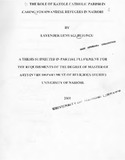| dc.description.abstract | Large-scale movements of refugees have become a defining characteristic of
the contemporary world. At few times in recent history have such large numbers of
peoples in so many parts of the globe been obliged to leave their own countries to
seek safety elsewhere. The refugee problem is reaching critical proportions in
almost all parts of the world, placing the structures and institutions of international
protection under stress. Humanitarian organizations are struggling to cope with the
mounting demands made upon them. Governments in every continent are expressing
alarm about the growing scale of the refugee problem, and are increasingly reluctant
to bear the costs which they feel it imposes on them. The needs of refugees are too
often seen as being at odds both with interests of states and with political
pragmatism.
Humanitarian organizations have responded to the plight of refugees by
providing them with immediate needs: food, housing, water, sanitation and clothing.
This study set out to investigate the holistic approach adopted by Kayole Catholic
Parish in caring for Rwandese refugees in Nairobi. The holistic approach aims at
making Rwandese refugees to be restored to spiritual wholeness and at the same
time overcome material poverty. This study has three objectives: (a) to investigate
flight dynamics and obstacles that Rwandese refugees encountered, (b) to study the
dimensions of integration undergone by the refugees at Kayole Christian. Community Centre (KCCC), and (c) to find out the holistic care given to Rwandese
refugees.
The study is based on Howard Clinebell's theory of The Church as the
Centre of Promoting Wholeness. This theory explains the holistic approach that a
church can adopt while caring for the poor and oppressed. He argues that
traditionally, the church's task has been divided into four functions - Kerygma
(proclaiming the good news of God's love), didache (teaching), Koinonia (the
establishing of a caring community, and diakonia (the expression of the good news
in loving service).
This study is based on both library and field research. The field research
yielded the primary data of the study. To acquire information for the study, four
research methods were used: questionnaire-interview, informal interviews,
participant observation and non-participant observation. Data got from the field,
mainly from Rwandese refugees and those who care for them has been used to test
the following hypotheses of the study: (a) that the length of stay in a host country
has little relationship to material improvement of Rwandese refugee households, (b)
that a holistic assistance to refugees leads to their healthy human development and
integration into the host community.
The study observed that Kayole Catholic Parish was initially pre-occupied
with Kerygma (proclaiming the good news of God's love) and didache (teaching).
The study revealed that Kayole Catholic Parish adopted the holistic approach when
caring for refugees after the influx ofRwandese refugees at the parish following the
crisis in Rwanda in 1994.
The study revealed that Kayole Catholic Parish aims at expressing the good
news in loving service (diakonia). It shows that the diakonal work entails both the
physical and spiritual dimensions of life.
The study showed that spiritual wholeness is the core of all human
wholeness. It revealed that human crises have a spiritual dimension and that they
cannot be fully overcome until the spiritual yearnings of the human beings have
been met. The study showed that pastoral care is a valuable instrument for fostering
spiritual wholeness.
In the parish the encounter of newcomers and established members offers the
opportunity to live the new commandment of the Lord to love one another (see In.
13:34). If aware and sensitive to the presence of refugees, pastors and parish teams
can lead the whole community to welcome them, for there are no aliens in the Body
of Christ.
Together, then, as we grow strong in the familiarity of God's love, we build a
more perfect and more inclusive community. | en |

